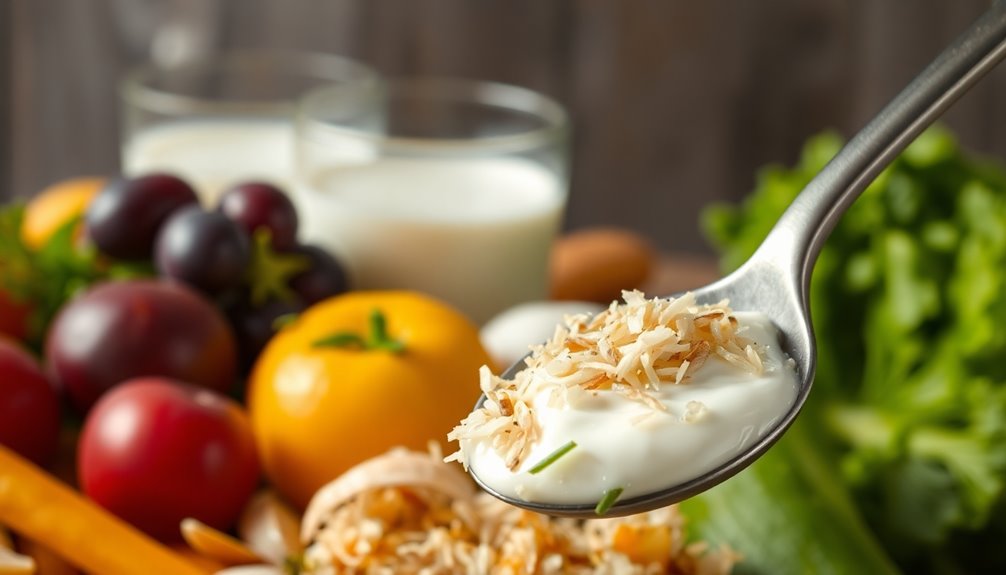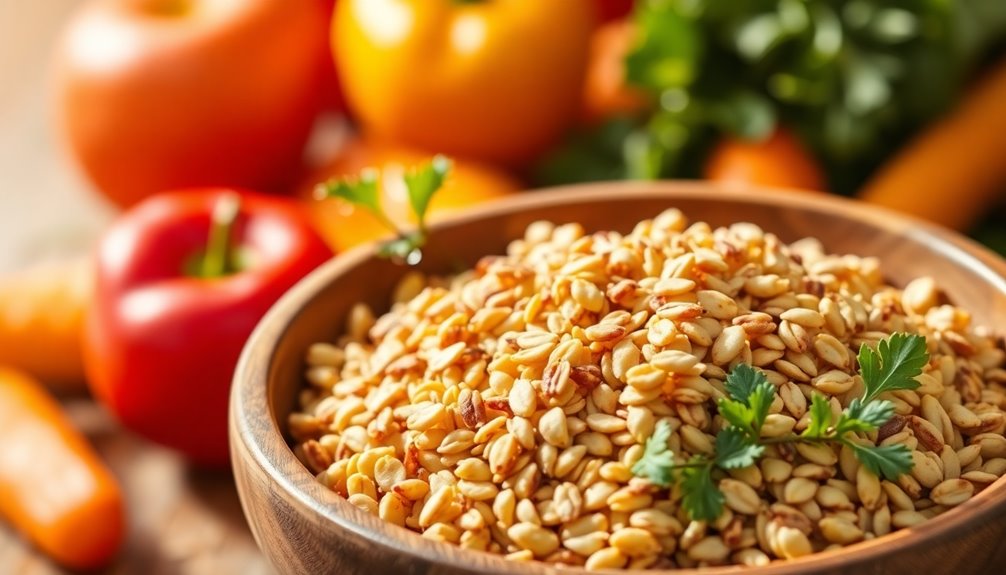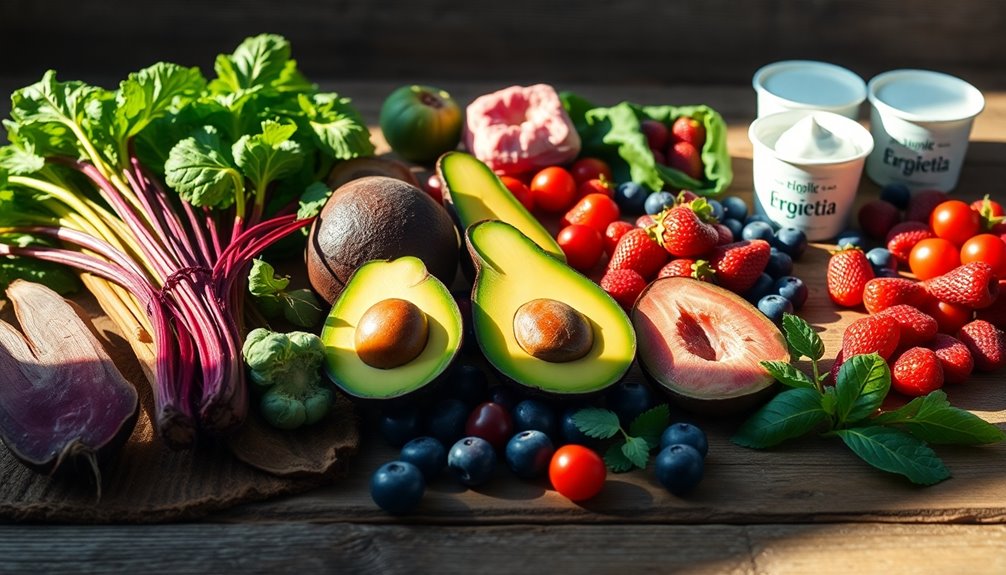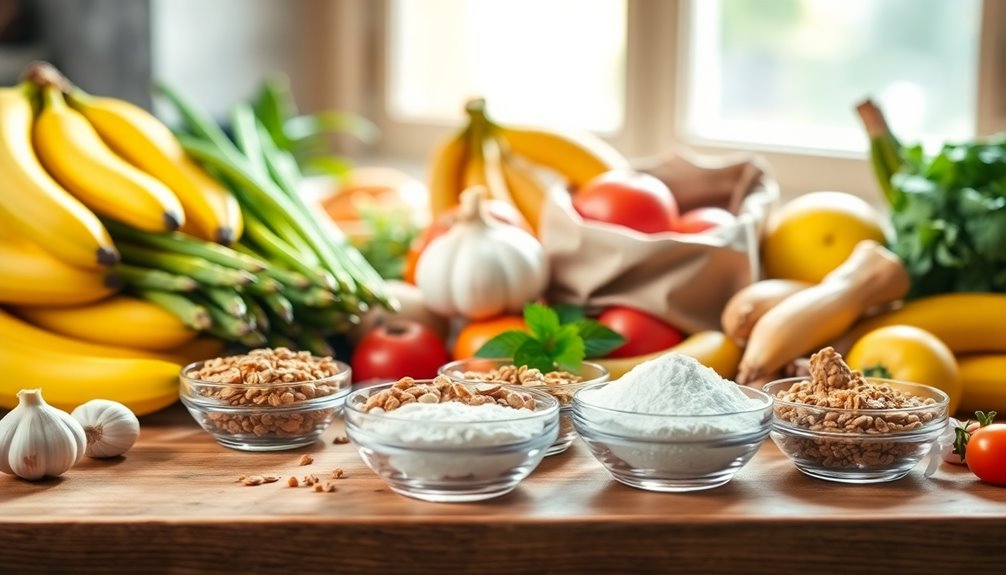Prebiotics are non-digestible fibers that feed beneficial gut bacteria, essential for a healthy microbiome. By incorporating foods rich in prebiotics, like garlic, bananas, and asparagus, you actively support the growth and activity of these good bacteria. This not only helps maintain a balanced gut environment but also contributes to improved digestion, immune function, and even mental health. Prebiotics can reduce bloating and constipation, fostering long-term wellness. By understanding how they work, you can make informed dietary choices that enhance your gut health. There's much more to discover about prebiotics and how they can benefit you further.
Key Takeaways
- Prebiotics are non-digestible fibers that serve as food for beneficial gut bacteria, promoting their growth and activity.
- They help maintain a balanced gut microbiota, essential for overall digestive health.
- Prebiotics support immune function by nurturing beneficial bacteria, which produce short-chain fatty acids beneficial for gut health.
- Consuming prebiotic-rich foods like garlic and bananas can enhance gut bacteria diversity, contributing to a healthier microbiome.
- Prebiotics complement probiotics by creating a favorable environment for new beneficial bacteria to thrive in the gut.
What Are Prebiotics?

Prebiotics are non-digestible food components, typically found in various plant-based foods, that play an important role in promoting the growth of beneficial gut bacteria. These substances serve as food for probiotics, the beneficial microorganisms that contribute to a healthy gut environment. By incorporating prebiotic fiber into your diet, you can support the balance of your gut microbiome, which is essential for overall well-being.
You might be surprised to learn that many common foods are rich in prebiotic fiber. Foods like garlic, onions, bananas, and asparagus contain these valuable components, making it easier to incorporate them into your meals.
However, if you find it challenging to consume enough prebiotic-rich foods, prebiotic supplements can be a convenient alternative. These supplements can provide a concentrated dose of prebiotic fiber, ensuring you're giving your gut the support it needs.
Research indicates that prebiotics can enhance digestive health by improving nutrient absorption and reducing the risk of gastrointestinal issues. They're also associated with various other health benefits, including better immune function and even mood regulation. Additionally, a healthy gut microbiome is crucial for managing chronic diseases, such as chronic kidney disease.
The Importance of Gut Health

Maintaining a healthy gut is foundational for overall health and well-being. Your gut plays a pivotal role in various bodily functions, influencing everything from digestion to mental health.
One of the most striking aspects of gut health is the gut-brain connection, which highlights how your gut microbiome communicates with your brain. This interaction can affect mood, stress levels, and cognitive functions. When your gut is in balance, you're more likely to experience improved mental clarity and emotional stability.
Moreover, a healthy gut is essential for a robust immune system. About 70% of your immune cells reside in your gut, and a diverse microbiome supports their function. When your gut microbiota is out of balance, it can lead to increased inflammation and a higher susceptibility to infections. This underscores the importance of nurturing your gut to bolster your body's defenses.
You mightn't realize it, but what you eat greatly impacts your gut health. Incorporating fiber-rich foods, such as fruits, vegetables, and whole grains, can help cultivate a thriving gut microbiome. Additionally, understanding the role of prebiotics can empower you to make informed dietary choices that foster gut health. Consuming grains that are low in glycemic index can also support a healthier gut environment by minimizing blood sugar spikes and inflammation.
How Prebiotics Work

Discover how prebiotics play an important role in enhancing gut health by serving as food for beneficial bacteria. These non-digestible fibers, found in foods like garlic, onions, and bananas, are essential for nourishing your gut microbiota. When you consume prebiotics, they travel to your colon undigested, where they're fermented by the beneficial bacteria residing there.
By promoting the growth and activity of these good bacteria, prebiotics help maintain a balanced gut microbiota. This balance is crucial for your digestive health, as it can affect everything from nutrient absorption to immune function. When your gut microbiota thrives, it can enhance your overall well-being, reducing the risk of digestive disorders and fostering a healthier gut environment.
Moreover, prebiotics can help to create a more diverse microbial community in your gut. A diverse microbiota is associated with better health outcomes and a stronger immune system. When you incorporate prebiotic-rich foods into your diet, you're actively supporting this microbial diversity, which in turn can lead to improved digestive health.
It's important to remember that not all fibers are created equal when it comes to prebiotics. Specifically, fibers like inulin and oligofructose are well-known for their prebiotic effects. By choosing foods rich in these specific fibers, you're directly influencing the health of your gut microbiota. Additionally, a plant-based diet that is rich in prebiotic foods can significantly enhance your gut health and overall vitality. So, make an effort to include prebiotics in your daily diet and observe how it positively impacts your digestive health.
Benefits of Prebiotics

The health benefits of incorporating prebiotics into your diet extend far beyond just supporting gut bacteria. When you consume prebiotics, you're not only nourishing beneficial gut bacteria but also enhancing your overall health. One significant advantage is improved digestive health. Prebiotics help regulate bowel movements, reduce bloating, and alleviate constipation, making your digestive system function more effectively. When your gut is healthy, you're likely to feel better overall.
Additionally, prebiotics play an essential role in immune support. A well-balanced gut microbiome is directly linked to a stronger immune system. By fostering the growth of beneficial bacteria, prebiotics help your body defend against harmful pathogens. This means you might experience fewer colds and infections, allowing you to engage more fully in your life and activities.
Moreover, prebiotics can help reduce inflammation in the gut, which is vital for preventing chronic diseases. By including them in your diet, you're taking a proactive step towards long-term health. Recent studies suggest that reducing oxidized cholesterol through dietary changes may also positively impact your gut health.
It's vital to remember that these benefits aren't just for those with digestive issues; they can enhance well-being for everyone. By choosing to integrate prebiotics into your meals, you're not only benefiting your gut bacteria but also nurturing your immune system and promoting overall digestive health. Your body will thank you for it, and you'll likely feel more vibrant, connected, and engaged in daily life. Embrace the power of prebiotics and experience the difference they can make in your health journey.
Sources of Prebiotics

When it comes to integrating prebiotics into your diet, you'll find that a variety of food sources can help you meet your nutritional needs. Prebiotics are primarily found in fiber-rich foods, which act as fuel for the beneficial bacteria in your gut. By including these foods in your meals, you can enhance your digestive health and overall well-being.
Some excellent sources of prebiotics include garlic, onions, leeks, asparagus, and bananas. These foods aren't only delicious but also pack a powerful punch when it comes to promoting gut health.
Whole grains like oats, barley, and wheat are also rich in prebiotic fibers, contributing to a balanced diet. Additionally, legumes such as lentils, chickpeas, and beans are fantastic options that provide both protein and prebiotic benefits. Including whole-food protein sources in your diet can further support your gut health and overall nutrition.
If you find it challenging to get enough prebiotics from your diet alone, you might consider prebiotic supplements. These can be a convenient way to make sure you're meeting your body's needs, especially if you're busy or have dietary restrictions. However, it's always best to consult with a healthcare professional before starting any supplement regimen.
Ultimately, focusing on a diverse range of fiber-rich foods can make it easier to add prebiotics into your diet. By doing so, you'll support not only your gut health but also foster a sense of belonging within a community that values wellness and nutrition.
Prebiotics vs. Probiotics

Understanding the difference between prebiotics and probiotics can greatly enhance your approach to gut health. While both play vital roles in supporting digestive health, they function in distinct ways.
Prebiotics are non-digestible fibers that serve as food for beneficial gut bacteria, helping to nurture and strengthen your gut microbiota. They promote the growth of these microorganisms, which in turn can improve your overall digestive health.
On the other hand, probiotics are live microorganisms, often referred to as "good" bacteria, that can provide health benefits when consumed in adequate amounts. They help to restore balance to your gut microbiota, particularly after disruptions caused by factors like poor diet, illness, or antibiotic use. While prebiotics support the growth of good bacteria, probiotics actively introduce new beneficial bacteria to your digestive system.
In essence, prebiotics and probiotics work together harmoniously. A well-balanced gut microbiota relies on both for peak function. By incorporating prebiotics into your diet, you're essentially nourishing the good bacteria already present in your gut. Meanwhile, adding probiotics can help replenish and diversify these bacteria, leading to improved digestive health.
Understanding this dynamic can empower you to make informed dietary choices. By appreciating the unique contributions of prebiotics and probiotics, you'll be better equipped to support your gut microbiota, enhancing not just your digestive health but your overall well-being as well. Additionally, incorporating certain dietary strategies, such as Half Day Keto, may also support gut health by promoting beneficial metabolic processes.
Incorporating Prebiotics Into Your Diet

Incorporating prebiotics into your diet can greatly enhance your gut health by supporting the growth of beneficial bacteria. You can start by including a variety of prebiotic-rich foods in your meals. Foods such as garlic, onions, asparagus, and bananas not only offer flavor but also provide essential fibers that feed your gut microbiome. Additionally, research from the Diabetologia journal suggests that a healthy gut microbiome may play a role in managing insulin sensitivity.
Consider trying out some prebiotic-rich recipes to make it easier to incorporate these foods into your daily routine. For those who prefer convenience, prebiotic supplements can also be beneficial, offering a concentrated source of these crucial fibers.
Here's a quick reference table to help you choose prebiotic foods and recipes:
| Prebiotic Food | Health Benefits | Recipe Idea |
|---|---|---|
| Garlic | Supports immune function | Garlic roasted vegetables |
| Bananas | Boosts digestion | Banana overnight oats |
| Asparagus | Promotes calcium absorption | Grilled asparagus salad
Future Research on Prebiotics

Exploring the future of prebiotic research reveals promising avenues for enhancing gut health and overall well-being. As you investigate further into this field, you'll find that the development of prebiotic supplements is gaining momentum. These supplements could potentially target specific gut bacteria, allowing for tailored approaches to individual health needs. Researchers are examining various forms, such as powders, capsules, and functional foods, to make prebiotics more accessible and effective.
Moreover, the exploration of prebiotic-rich foods continues to expand. Future studies may focus on identifying new sources of prebiotics, such as lesser-known fruits and vegetables, and enhancing their bioavailability. This will help you incorporate more of these essential nutrients into your diet without relying solely on supplements.
Another exciting avenue involves the interaction between prebiotics and the gut microbiome. Understanding how different prebiotics impact various bacterial strains could lead to more personalized dietary recommendations. This means that you might one day receive tailored advice based on your specific gut health profile. Additionally, ongoing research into brainwave guidance technology could offer insights into the psychological aspects of gut health and its connection to overall well-being.
Clinical trials are likely to investigate the long-term effects of prebiotic consumption on chronic diseases, such as obesity and diabetes. This research will help solidify the role of prebiotics in overall health.
Frequently Asked Questions
Can Prebiotics Help With Specific Digestive Disorders?
Yes, prebiotics can help with specific digestive disorders like irritable bowel syndrome (IBS) and Crohn's disease. They promote beneficial gut bacteria, which may reduce symptoms and improve overall gut health. Research shows that those with IBS often benefit from prebiotics, as they can ease bloating and discomfort.
For individuals with Crohn's disease, integrating prebiotics into your diet might support remission and enhance your digestive function. Always consult your healthcare provider before making changes.
Are There Side Effects of Taking Prebiotics?
About 25% of people experience digestive discomfort when starting prebiotics, highlighting the significance of understanding prebiotic interactions. While many find prebiotics beneficial, there are potential risks, such as bloating, gas, or diarrhea, especially if taken in excessive amounts. It's important to start with a low dose and gradually increase it, allowing your body to adjust.
Listening to your body can help you enjoy the benefits while minimizing any side effects.
How Do Prebiotics Influence Mental Health?
Prebiotics can greatly influence your mental health by impacting the gut-brain axis. This connection means that the health of your gut can affect your brain function and mood.
Research shows that prebiotics may help reduce anxiety by promoting the growth of beneficial gut bacteria, which in turn can enhance the production of neurotransmitters linked to mood regulation.
Can Children Consume Prebiotics Safely?
Can children consume prebiotics safely? Absolutely! Prebiotics can provide essential immune support and contribute to healthy growth development in kids. They're naturally found in foods like bananas and oats, making them easy to incorporate into your child's diet.
Research shows that these fibers can promote gut health, which is vital for overall well-being. However, it's wise to consult with a pediatrician before introducing new supplements, ensuring they're right for your child.
Are Prebiotic Supplements as Effective as Food Sources?
When considering whether prebiotic supplements are as effective as food sources, evaluating your gut microbiome's needs is crucial. While supplements can provide concentrated prebiotic sources, whole foods like fruits, vegetables, and whole grains offer additional nutrients that support overall health. Research suggests that food sources may enhance the diversity of your gut microbiome more effectively, promoting better digestion and immune function. Ultimately, a balanced diet might be the most suitable approach for excellent gut health.
Conclusion
Incorporating prebiotics into your diet is like planting seeds in a garden; with the right nutrients, your gut bacteria thrive, promoting overall health. As you nourish these beneficial microorganisms, you'll likely experience improved digestion and enhanced immune function. The growing body of research underscores the importance of prebiotics in maintaining gut health, making it essential to prioritize these fibers in your meals. By doing so, you cultivate a healthier, more balanced microbiome that supports your well-being.



